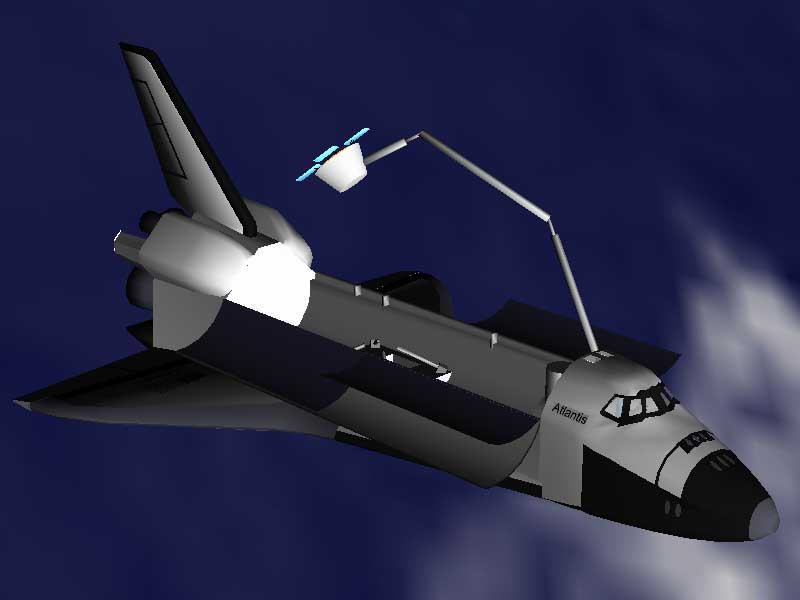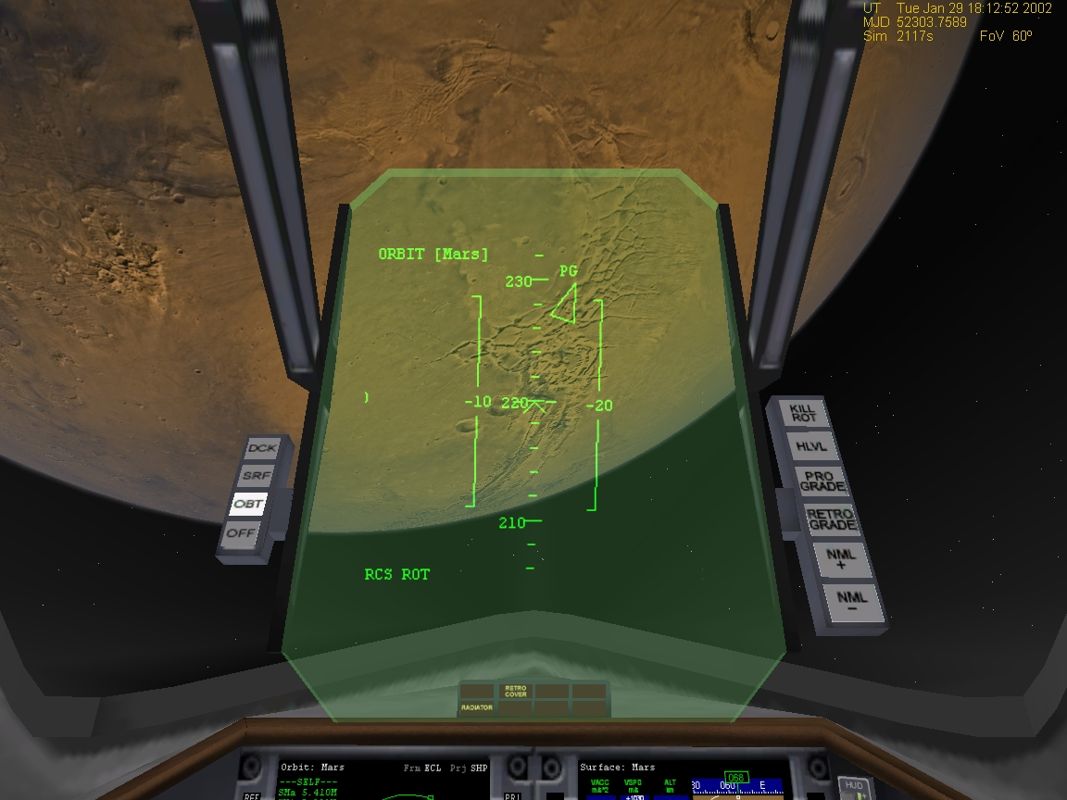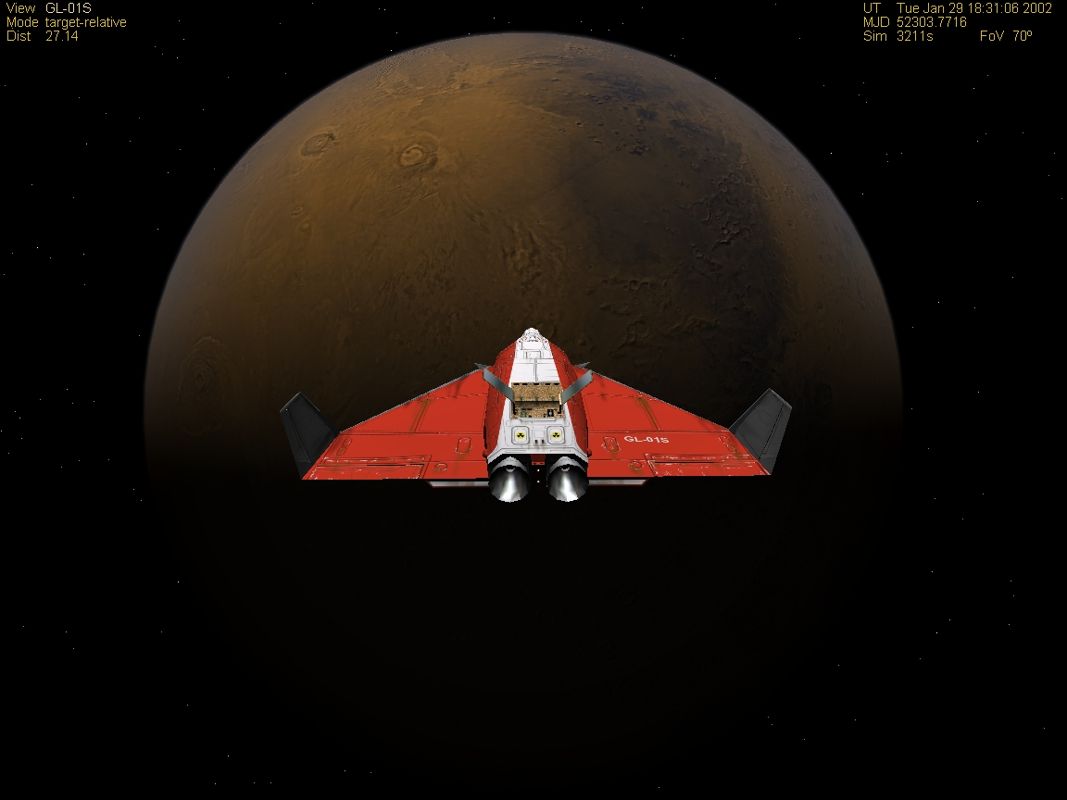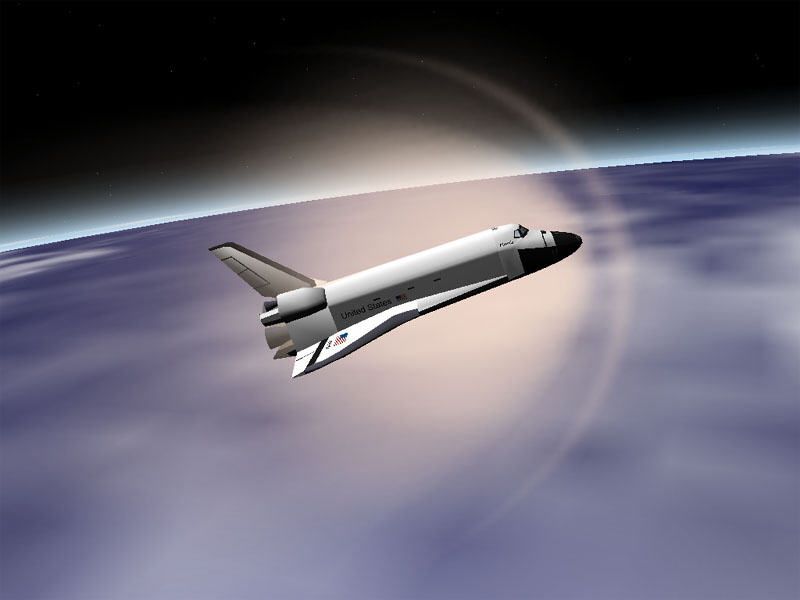Retro Replay Review
Gameplay
Orbiter delivers an unparalleled level of realism with its meticulously modeled Newtonian flight physics. Under the hood, every thrust vector, orbital insertion, and docking maneuver obeys the same laws that govern real-world celestial mechanics, making each mission feel both rewarding and intellectually stimulating. Whether you’re guiding the Space Shuttle Endeavour on a precise rendezvous with the International Space Station or plotting a Hohmann transfer to Mars, the simulator demands patience, precision, and a solid grasp of orbital mechanics.
(HEY YOU!! We hope you enjoy! We try not to run ads. So basically, this is a very expensive hobby running this site. Please consider joining us for updates, forums, and more. Network w/ us to make some cash or friends while retro gaming, and you can win some free retro games for posting. Okay, carry on 👍)
The in-game interface centers around configurable multi-function displays (MFDs) that present navigation data, autopilot controls, and diagnostic readouts. Prior to launch, you can choose from a library of MFD programs to suit your preferred style—automatic orbital insertion aids, manual docking calculators, or custom scripts for interplanetary journeys. This flexibility ensures that beginners can rely on guided assistance while veteran pilots can disable autopilots and fly entirely by instrument.
Orbiter supports a wide variety of vehicles, from historically accurate craft like the Space Shuttle and Soyuz to futuristic, homebrew vessels designed by the modding community. Each spacecraft comes with its own control manual and flight dynamics, requiring you to learn distinct procedures for launch, ascent, orbital adjustments, and reentry. The included default missions range from low-Earth operations to gravity assists around Jupiter, offering dozens of hours of content before you even install third-party addons.
Graphics
Although Orbiter’s primary focus is simulation fidelity, its graphics engine holds its own in depicting the vastness of space. Planetary bodies are rendered with realistic textures, atmospheres exhibit subtle limb darkening, and spacecraft models cast accurate shadows as they traverse the sunlit void. Small asteroids and debris fields appear as textured meshes, while gas giants like Jupiter showcase swirling cloud bands that enhance immersion.
Performance tuning is straightforward thanks to the pre-launch configuration window, where you can adjust detail levels, draw distance, and shadow quality to match your hardware. On modern mid-range systems, you can enjoy smooth frame rates with high-resolution textures and dynamic lighting. Even on older rigs, lowering a few settings preserves the core visual experience without impacting the sophisticated physics simulation.
One of Orbiter’s greatest visual strengths lies in its modding support. Enthusiasts have released ultra-high-resolution planetary textures—some up to 32768×16384 pixels—that replace default maps with lifelike surface details. Custom star catalogs, nebula overlays, and cockpit skins further enhance realism, allowing you to transform the simulator into your personal cinematic spacefaring sandbox.
Story
While Orbiter does not present a scripted narrative or campaign in the traditional sense, it excels at letting you craft your own spacefaring stories. From your first tentative launch from Cape Canaveral to a daring docking on the International Space Station, each mission unfolds as a chapter in your personal astronaut career. Success and failure both carry weight: a misaligned burn can strand you in orbit, while a perfect entry profile earns you bragging rights among fellow players.
The included scenario editor allows you to design bespoke missions that reflect historical events or entirely fictional adventures. Reenact the Apollo lunar landings, stage cargo runs to future Martian colonies, or simply explore the solar system at your own pace. This open-ended approach fosters creativity, making every playthrough unique and wholly driven by your ambitions.
Orbiter’s lack of a rigid story arc is its greatest narrative strength. It places you in the pilot’s seat, armed only with your wits, physics textbooks, and mission parameters. In doing so, it recreates the pioneering spirit of early space exploration, inviting you to write your own chapter in humankind’s quest to conquer the final frontier.
Overall Experience
As a freeware title authored by Dr. Martin Schweiger, Orbiter represents a labor of love that has been refined continuously since 2000. With biannual official releases and frequent community patches, the simulator remains fresh, stable, and responsive to user feedback. Whether you’re a spaceflight enthusiast or an aspiring orbital mechanic, you’ll find ample opportunities to learn, experiment, and master the complexities of space travel.
The learning curve is undeniably steep, but the payoff is immense. Newcomers can follow detailed tutorials, consult online forums, and download preconfigured mission packages to ease into the simulator. Seasoned users will appreciate the depth offered by third-party addons, from realistic mission planners to complete new solar systems. This expansive ecosystem keeps Orbiter both challenging and endlessly replayable.
In the realm of space simulators, Orbiter stands out for its combination of scientific accuracy, configurability, and completely free access. If you’re seeking a sandbox where you set the objectives, design the missions, and experience the triumphs and setbacks of real orbital flight, Orbiter remains unmatched. Its ever-growing community and robust mod pipeline ensure that the journey to the stars is only beginning.
 Retro Replay Retro Replay gaming reviews, news, emulation, geek stuff and more!
Retro Replay Retro Replay gaming reviews, news, emulation, geek stuff and more!








Reviews
There are no reviews yet.